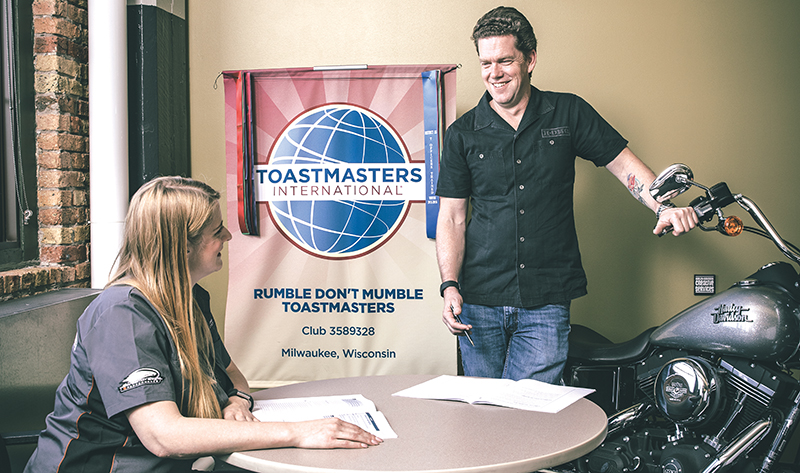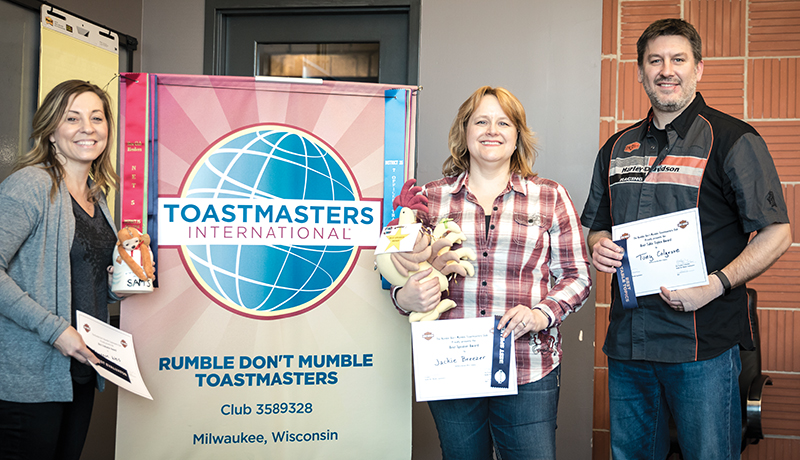By the time Ralph Smedley hosted the first meeting of the Number One Toastmasters club in Santa Ana, California, in 1924, Harley-Davidson was just 20 years old, and had become the largest motorcycle company in the world. Fast forward to the 21st century, when the two successful organizations crossed paths, and you’re in for a great ride. And, as the Harley-Davidson website states, “Every great ride has a great story.” This is the story.
Cindy Laatsch, a 17-year Harley employee, joined Toastmasters in 2009. Four years later, when Laatsch, Harley’s IT program manager, was in a casual conversation with Dave Cotteleer, vice president and chief information officer for the company, she suggested they start a Toastmasters corporate club. His response was immediate: “Yes!”
A Good Kick-start
Not only is Cotteleer passionate about communication and leadership, he also has had a rewarding personal experience with Toastmasters. “More than 20 years ago,” he says, “while I was in graduate school at Carnegie Mellon University in Pittsburgh, a friend invited me to Toastmasters—and I was intrigued. I went, and I immediately saw the value. Plus, it was fun. It was also serious, helping people communicate with confidence. I wasn’t comfortable speaking in public, but I wanted to be.” He says Toastmasters helped.
Cindy Laatsch, IT Program Manager at Harley-Davidson, sees the Harley Toastmasters clubs as “breeding grounds” for leaders.
Laatsch, DTM, and District 35 director, recalls why she had mentioned Toastmasters to Cotteleer, a top executive at the company. When Laatsch was a new member, she attended everything from club meetings to conferences. “I met corporate club members from other companies and saw the impact a Toastmasters corporate club could have,” she says. “I work in IT, but my background is in training, communication and change management. I knew Toastmasters could make a big difference in an IT department. When Dave gave his support, I got busy starting a club.” In February 2014, the first Harley-Davidson corporate club, Rumble Don’t Mumble, was chartered, with Laatsch and other members of the Harley-Davidson IT groups as members.
Enthusiasm spread quickly. In November 2014, a second corporate club chartered, Screamin’ Eagle Speakers, comprised mostly of engineers. In May 2016, a third club, Cruisers Toastmasters, chartered at the Harley-Davidson Financial Services division in Plano, Texas. Most recently, in June 2016, a fourth club, Chrome Conversations, chartered at the Milwaukee headquarters. That one is open to all Harley-Davidson employees, making Toastmasters now part of the Harley culture.
An Iconic Brand
Harley-Davidson’s iconic brand evokes a feeling of acceptable rebellion, personal expression and the thrill of exploring the open road on a rumbling and shiny motorcycle. Driven by its commitment to “help people fulfill dreams of personal freedom,” the company knows the significance of effective communication in corporate strategy. When the company incorporated Toastmasters into its culture, the result was extraordinary.
“We’re excited to develop leaders, especially those in management positions,” Cotteleer says. “I knew Toastmasters would help. But what was unexpected was the rapid growth and improvement in the employees who joined, and the impact they had on the company. The results were so obvious—like night and day. People were clearer in their communications. They were well-prepared, more engaging, calm and able to handle quick questions and complicated situations. When you have more employees like that, they become better-quality leaders who achieve goals faster. That can only be good for the company.”
 Dave Cotteleer and Shae Schoenherr review Toastmasters manuals to prepare for a club meeting.
Dave Cotteleer and Shae Schoenherr review Toastmasters manuals to prepare for a club meeting.
It’s true. The way a company communicates can make the difference between success and failure. Research shows that businesses with effective communications are 50 percent more likely to have lower employee turnover. Strong communication builds stronger relationships with customers, vendors and stakeholders, as well as improves internal esprit de corps. Happy employees are productive employees.
Jaki Van Valin, CC, CL, is the director of information management in the Global Information Services department at the company. She sees firsthand how good communication skills benefit employee engagement. “Recently,” she says, “we realigned all Information Management teams across the country into one team. To better integrate everyone, I used an exercise that mirrored the Ice Breaker.” She set up an online team meeting where each person introduced themselves in four minutes using only three slides. “They could be as creative as they wanted, as long as we learned more about them.” To make things fun, they followed up with a survey and feedback mechanism, awarding prizes for the best presentation. “Not only did the team enhance their presentation skills,” Van Valin says, “team engagement soared. We measure employee engagement through the Gallup Survey, and our scores have continuously increased each year. I credit my Toastmasters experience for that.”
The Customer Connection
Cotteleer says helping customers fulfill their dreams of personal freedom is the company’s core goal. “We want to be the most customer-led company, period,” he says. “To do that, we must connect with customers, and you can’t do that with just a small team. All employees must engage well, and be comfortable with conversation. All employees must communicate clearly and passionately. … When I see some of our Toastmasters employees address a large group I’m so impressed with them.”
One success story is from Shae Schoenherr, CC, ALB, lead resource manager with the Global Information Services (GIS) department. She joined Toastmasters to develop her communication skills. “Three years ago,” she says, “I was asked to present at a conference and my reaction was ‘Absolutely not!’ But a year after joining Toastmasters I was asked again, and this time I felt comfortable enough to agree. My Toastmasters experience helped me organize an effective presentation, but even more so, Table Topics helped me prepare for the Q&A portion of the session. I could think on my feet and speak in an organized manner.” Laatsch adds, “Toastmasters has gotten quite a reputation here. When someone gives an awesome presentation, the talk around the company is ‘I bet they’re in Toastmasters!’”
When the company incorporated Toastmasters into its culture, the result was extraordinary.
Haley Loprieno, an associate analyst, also in the GIS department, knows this well. She was up against some tough Shark Tank-style competition when employees were challenged to propose innovative ideas in a contest for new products or services that Harley-Davidson could offer to customers. “In the weeks prior to the contest,” she says, “as I looked at my very talented co-workers, I thought their concepts were better than mine. I knew I would have to wow the judges with a great presentation. I did! I took second place, largely because of my presentation skills. For weeks, my co-workers congratulated me, saying my speech had a big impact on them. Toastmasters gave me confidence and helped me incorporate different speaking styles and surprise elements that gave my talk that extra kick.”
Going Full Throttle
The appeal of Toastmasters is not just because people are improving their skills. Harley club members are also having fun. With a focus on building relationships, the corporate culture at Harley-Davidson attracts naturally fun and gregarious people. Add in Toastmasters with the applause, recognition, freedom to speak about fun topics and a focus on personal development and you have the recipe for a lively and contagious atmosphere. And while the clubs have open houses and membership drives, membership growth results more from organic word-of-mouth methods, and fun is a strong catalyst for growth.
Laatsch says, “At Harley-Davidson, we are proud to be employees and proud to be Toastmasters. Employees wear HD clothing and boots almost everywhere, so when we ‘arrive’ at a district event, people know. Fellow Toastmasters even make motorcycle noises and yell things like ‘RRRRRRUUUUMMMMBLE!!!!!’ It’s fun to be connected to such a cool product, and to know the depth of Harley-Davidson in the fabric here in Milwaukee.”
 From left: Shannon Weis displays the club’s “monkey award” for Best Evaluator, Jackie Breezer holds the “chicken award” for Best Speaker and Tony Colgrove shows off the Best Table Topics award. These awards prompt discussions of club-membership benefits when other employees see them displayed on award-winners’ desks at work.
From left: Shannon Weis displays the club’s “monkey award” for Best Evaluator, Jackie Breezer holds the “chicken award” for Best Speaker and Tony Colgrove shows off the Best Table Topics award. These awards prompt discussions of club-membership benefits when other employees see them displayed on award-winners’ desks at work.
The word-of-mouth club-building strategy mimics the corporate approach to growing the company’s loyal customer community: To develop a great product, provide outstanding customer service and cultivate camaraderie between people who share the owner experience.
Cotteleer emphasizes, “Nobody needs a motorcycle. It’s a voluntary participation in a lively community. Freedom is the brand, and the sense of community runs through the brand. For the dealer to deliver a great experience, the dealer has to have great experiences with the company. And for the company to deliver that great experience to the dealer, we, as employees, have to deliver a great experience to one another. Communication and collaboration are foundational to that. It’s a prerequisite because everything cascades to the customer. That’s where Toastmasters comes in. My team … the global IT leaders of the company, is excited about Toastmasters. Just like me, they support Toastmasters here because we all see the benefit. I even have the club banner on display here in my office.”
Maripat Blankenheim, director of corporate communication at Harley, echoes Cotteleer’s support of Toastmasters. “It’s hard for employees speaking on behalf of the company if they’re not polished, clear or comfortable,” she says. “If we can improve their comfort and effectiveness, that’s a good thing. When I see one of our corporate leaders or technical experts speaking to the media or at a conference—and they are engaging, poised and polished—that reflects well on our company and our brand is preserved.”
“When I see one of our corporate leaders or technical experts speaking to the media or at a conference—and they are engaging, poised and polished—that reflects well on our company.”
— MARIPAT BLANKENHEIMLaatsch sees the Harley Toastmasters clubs as “breeding grounds” for leaders. “I’ve seen many members develop within the club and step into leadership roles both within Toastmasters and here at Harley. In addition, since our corporate culture is relational and casual, we interact a lot with senior managers who are very open and approachable. Conversational skills are important.”
Cotteleer agrees. He says, “The impression you make on the people above you (in the leadership chain) are made in those five-minute chunks. If you can speak clearly and concisely, if you can settle yourself, present yourself well, the impact is huge. Things happen, like promotions, moving ideas forward, resolving conflicts and solving problems.”
Indeed, every great ride has a great story. The story of Toastmasters and Harley-Davidson is one worth telling.
Maureen Zappala, DTM, AS is a former NASA propulsion engineer. Today she’s a professional speaker, author and presentation skills coach, as well as founder of High Altitude Strategies, a coaching and speaking service. Visit her website to learn more.



 Previous
Previous
 Previous Article
Previous Article